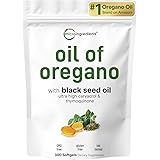Micro Ingredients Oil of Oregano Softgels, 300 Count | 2 in 1 Formulated with Black Seed Oil | 4X Strength Carvacrol & Thymoquinone | Plant Based, Non-GMO
$34.95 (as of February 20, 2026 22:26 GMT +00:00 - More infoProduct prices and availability are accurate as of the date/time indicated and are subject to change. Any price and availability information displayed on [relevant Amazon Site(s), as applicable] at the time of purchase will apply to the purchase of this product.)Probiotics and the Gut‑Brain Axis: What’s Realistic for Mood Support?
The gut and brain communicate through neural, immune, and metabolic pathways. Interest in “psychobiotics” has grown, but results vary by strain and condition. This overview keeps expectations realistic and helps you read labels.
Evidence Snapshot
Recent reviews suggest probiotics may offer modest benefits for mood symptoms in some people, with effects depending on the specific strains, combination products, and baseline health. Not all studies are positive, and the best strain/condition matches are still being clarified. For digestive comfort, look for labeled strains (e.g., Lactobacillus, Bifidobacterium) and aim for consistency over weeks.
How to Choose & Use
Check labels for genus–species–strain (e.g., Lactobacillus rhamnosus GG), CFU count at end of shelf life, storage guidance, and third‑party testing. Introduce gradually, take with food if preferred, and evaluate over 4–8 weeks. If you have a medical condition or take medications, review options with your clinician.
Disclaimer: Educational only; not medical advice.
References
- Journal of Affective Disorders. Meta‑analysis on probiotics/prebiotics/synbiotics and depression (2025).
- Frontiers in Psychiatry (PMC). Systematic review: probiotics and anxiety/depression (2024).
Accessed 2025-07-30.



